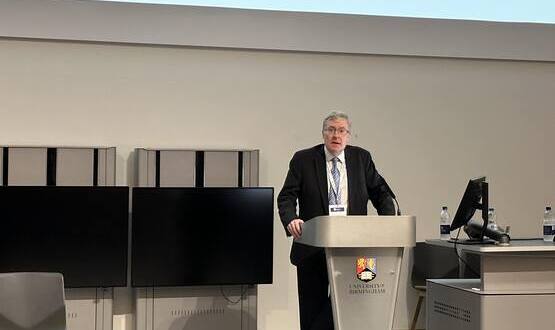After the Covid-19 pandemic public approval of the NHS “dropped off a cliff” due to pressures affecting basic levels of service and leading to lengthy waiting times, The King’s Fund CEO Richard Murray told the Summer Schools 2023 audience.
Speaking in the opening keynote session on day two of the event at the University of Birmingham, Murray said there has been a steep drop in NHS satisfaction because the health of the population of the UK is under a lot of pressure, with lots of adults off sick, placing stress on the NHS.
This has led to a significant drop in basic levels of service and an increase in waiting times, Murray explained, using the example of people experiencing over 12 hour trolley waits. In 2018/19, there were no people experiencing waiting times of this length, but in 2022/23 there were around 50,000.
However, these figures are not due to an increase in emergency admissions, with Murray pointing out the fact that the total number of emergency admissions has been consistently lower in 2022/23 compared to in 2018/19.
The King’s Fund CEO then spoke about the workforce shortage, observing that although it seems like many are leaving the NHS, the shortage is being covered up by a surge in international recruitment. All growth in the workforce is in the hospital sector, he said, whereas all other sectors have shrunk.
Solving the logjams around general practice and primary care more broadly will be key to tackling dissatisfaction with the health service, Murray added.
Murray also said that technology is considered “a significant part of the cavalry” to help tackle the workforce and productivity challenges facing NHS boards and senior leaders.
He concluded his keynote speech by mentioning that he recently shared a stage with Wes Streeting, the shadow health and social care secretary, who confirmed that he would not abolish integrated care systems (ICSs) if Labour win the next General Election.
Murray said that “all political parties are thinking about the longer term” with the NHS and technology set to be a key part of future political agendas. However, “the NHS needs to get back to previous levels of performance” if public satisfaction is to drastically improve, he told the audience.
He said that although the next year and a half could be “grim” for the NHS, he has huge optimism about population health and what can be done with population health management.
Digital Health Summer Schools is taking place at the University of Birmingham, where CCIOs, CIOs, CNIOs and aspiring digital health leaders enjoy two days of CPD-accredited content, rewarding education, networking, and best practice exchange, and have a unique opportunity to learn from the very best digital health leaders from across the UK.

